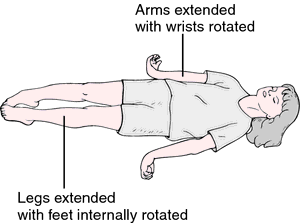Medical term:
decerebrate
decerebrate
[de-ser´ĕ-brāt]1. to eliminate cerebral function by transection of the brainstem or ligation of the common carotid arteries and basilar artery at the center of the pons.
2. a laboratory animal so prepared.
decerebrate rigidity a posture found in those with lesions of the upper part of the brainstem or severe bilateral lesions of the cerebrum; the patient lies in rigid extension with the arms internally rotated at the shoulders, elbows, knees, and hips extended, and fingers, ankles, and toes flexed. The jaw may be clenched with the neck hyperextended. Called also decerebrate posturing. 

Decerebrate rigidity (or posturing).
Miller-Keane Encyclopedia and Dictionary of Medicine, Nursing, and Allied Health, Seventh Edition. © 2003 by Saunders, an imprint of Elsevier, Inc. All rights reserved.
de·cer·e·brate
(dē-ser'ĕ-brāt),1. To cause decerebration.
2. Denoting an animal so prepared, or a patient whose brain has suffered an injury that renders the patient, in neurologic behavior, comparable with a decerebrate animal.
Farlex Partner Medical Dictionary © Farlex 2012
decerebrate
(dē-sĕr′ə-brāt′)tr.v. decere·brated, decere·brating, decere·brates
To eliminate cerebral brain function in (an animal) by removing the cerebrum, cutting across the brainstem, or severing certain arteries in the brainstem, as for purposes of experimentation.
adj. (also -brĭt)
1. Deprived of cerebral function, as by having the cerebrum removed.
2. Resulting from or as if from decerebration: decerebrate rigidity; decerebrate movements.
3. Lacking intelligence or reason.
n. (also -brĭt)
A decerebrate animal or person.
de·cer′e·bra′tion n.
The American Heritage® Medical Dictionary Copyright © 2007, 2004 by Houghton Mifflin Company. Published by Houghton Mifflin Company. All rights reserved.
de·cer·e·brate
(dē-ser'ĕ-brāt)1. To cause decerebration.
2. Denoting an animal so prepared, or a patient whose brain has suffered an injury causing neurologic impairment comparable with that of a decerebrate animal.
Medical Dictionary for the Health Professions and Nursing © Farlex 2012
decerebrate
Suffering from the effects of loss of cerebral activity, such as thought, consciousness, sensation and the power of voluntary movement.Collins Dictionary of Medicine © Robert M. Youngson 2004, 2005
decerebrate
[de-ser´ĕ-brāt]1. to eliminate cerebral function by transection of the brainstem or ligation of the common carotid arteries and basilar artery at the center of the pons.
2. a laboratory animal so prepared.
decerebrate rigidity a posture found in those with lesions of the upper part of the brainstem or severe bilateral lesions of the cerebrum; the patient lies in rigid extension with the arms internally rotated at the shoulders, elbows, knees, and hips extended, and fingers, ankles, and toes flexed. The jaw may be clenched with the neck hyperextended. Called also decerebrate posturing. 

Decerebrate rigidity (or posturing).
Miller-Keane Encyclopedia and Dictionary of Medicine, Nursing, and Allied Health, Seventh Edition. © 2003 by Saunders, an imprint of Elsevier, Inc. All rights reserved.
de·cer·e·brate
(dē-ser'ĕ-brāt),1. To cause decerebration.
2. Denoting an animal so prepared, or a patient whose brain has suffered an injury that renders the patient, in neurologic behavior, comparable with a decerebrate animal.
Farlex Partner Medical Dictionary © Farlex 2012
decerebrate
(dē-sĕr′ə-brāt′)tr.v. decere·brated, decere·brating, decere·brates
To eliminate cerebral brain function in (an animal) by removing the cerebrum, cutting across the brainstem, or severing certain arteries in the brainstem, as for purposes of experimentation.
adj. (also -brĭt)
1. Deprived of cerebral function, as by having the cerebrum removed.
2. Resulting from or as if from decerebration: decerebrate rigidity; decerebrate movements.
3. Lacking intelligence or reason.
n. (also -brĭt)
A decerebrate animal or person.
de·cer′e·bra′tion n.
The American Heritage® Medical Dictionary Copyright © 2007, 2004 by Houghton Mifflin Company. Published by Houghton Mifflin Company. All rights reserved.
de·cer·e·brate
(dē-ser'ĕ-brāt)1. To cause decerebration.
2. Denoting an animal so prepared, or a patient whose brain has suffered an injury causing neurologic impairment comparable with that of a decerebrate animal.
Medical Dictionary for the Health Professions and Nursing © Farlex 2012
decerebrate
Suffering from the effects of loss of cerebral activity, such as thought, consciousness, sensation and the power of voluntary movement.Collins Dictionary of Medicine © Robert M. Youngson 2004, 2005
Latest Searches:
Voraxaze - Voranil - Voorhoeve - voodoo - VOO - Vontrol - von - vomitus - vomiturition - vomitory - vomitoria - vomito - vomitive - vomiting - vomit - vomica - vomerovaginalis - vomerovaginal - vomerorostralis - vomerorostral -
- Service manuals - MBI Corp